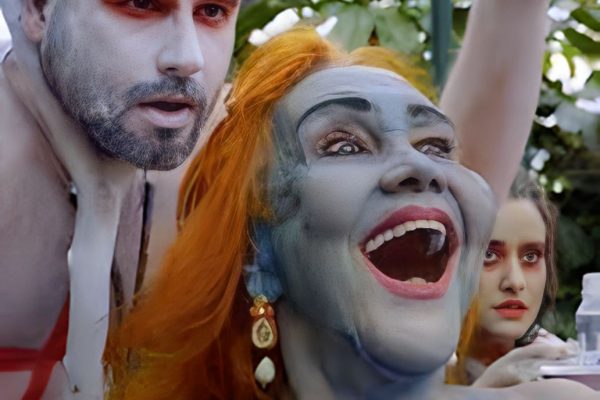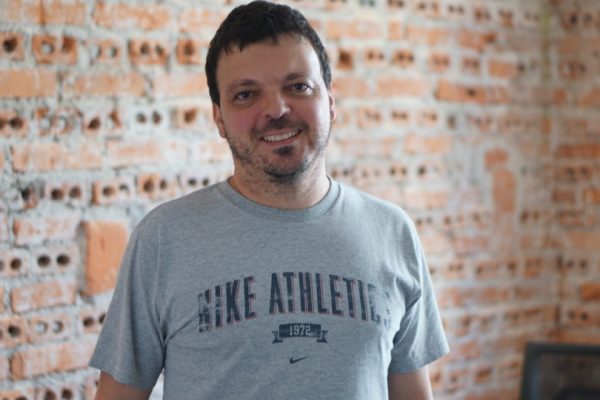A futuristic play inspired by Covid19 transcends boundaries and goes where no media coverage can reach: our homes
Seated in my apartment in Lagos last night, I watched a play on my phone but it felt like I was watching a film in a cinema.
This was my thought after seeing The Art of Facing Fear, the Covid19-inspired digital play developed by Brazil-based Os Satyros and which premiered in the South American country last June. It now features a trans-national cast from nine countries, 11 theatre companies operating from three continents.
The Art of Facing Fear is set in a dystopian future with the pandemic, lockdown and quarantine directive still in force 5555 days later. Overwhelmed by depression, loneliness, the fear of being infected and dying, growing intolerance and a terribly chaotic political system, people think up various strategies to stay alive and sane by keeping in touch with friends online. Aside from the internet and electricity, all forms of mass media as we know them today are non-existent.
The fear factor
“The idea is to establish the points in common among different national realities during the pandemic,” a statement released by the producers explained. “What are the fears that took over mankind during this period globally? What are the effects of social intolerance and political extremism in the world today?”
According to director and playwright Rodolfo García Vázquez, the play was developed with the Zoom app in mind. So that’s where it plays out and where we – actors and audience — all gather. And though now under the same roof, so to speak, we came from different corners of the world: Harare, Dakar, Newcastle, Stockholm, Durban, Cape Verde, Berlin, Antibes, Capetown and Lagos, to mention just some. And though we face vastly distinct everyday realities, it doesn’t take too long to see that each one of us is afraid somewhat, even if we didn’t think see it that way previously or shared them with anyone.
This is participatory theatre, so the hosts encourage us to let go and share one fear we have that’s been brought about by the pandemic. “What are you afraid of?” a voice asked.
“I’m afraid of missing out on my grandchild’s life,” one person typed in the chat window.
“I am afraid of losing loved ones and family members and I am afraid of the global economy and suffering of those who have lost income,” another audience member said.
Nick said he was afraid of “losing my wife and mother due to the virus, [and] maybe even going myself.”
“I’m afraid I’ll never hug my parents again,” Igor added to the exchange.
“Afraid my family and those I LOVE not surviving,” Fiona chipped in.
And Scott said: “I’m afraid that we will allow fear to rule.”
A memorial to the dead
The fear-laden chats continued for a couple more minutes, but we had still one more thought to share.
“Please, share with us anyone you know who has passed away as a result of the pandemic. Though they are no more, we want to remember them, honour them with a memorial in this performance. Please, go ahead and share; we want to read their names out loud. They won’t be forgotten.”
As it happened, some of us know someone who died from Covid19 – not just politicians and celebrities reported in the news. Not the nameless individuals buried in unmarked graves, but family and friends we knew closely. Even neighbours. They were flesh and blood, not numbers as the media, the World Health Organisation and, to bring it home (Nigeria), the National Centre for Disease Control have chosen to represent them in newscasts and periodic briefings.
“The old lady downstairs – we celebrated her 88th birthday on the Saturday,” a message popped up in the chats. “On the Sunday, the ambulance took her to the hospital and I joked with her saying: ‘they will be sick of you in a week and you’ll be back here, don’t worry my friend’. It was the last time I saw her…”
“Francoise was my Mother-in-Law, a revolutionary humanist and a joyful, hopeful hippie. We will miss her,” one participant added. “She gave so much joy to family and friends and people in need; but she was also disappointed with the injustices in the world, rightly so.”
“Vaughn ‘Bullet’ Raath died yesterday from Covid-19 complications. He was an awesome coach and great mentor,” Nick responded. “[He] led the SA men’s 035 indoor action cricket side to their world cup win. [He was] a legend gone too soon. Action cricket is poorer having lost him.”
“Matty was the greatest man I have known. He was my grandfather. He passed away in April, he was full of more kindness and gentleness than I have ever known.”
Reading what these compassionate strangers had to say, I felt obliged to contribute to the subject too. “Dan was an African-American broadcaster who lived for 20 years in Nigeria,” I said. “His death from Covid-19 weeks ago was a shock to his mentees, his fans and the country he impacted so positively.”
A dark, strange world
It was a struggle not to get emotional seeing all the names and personality traits of the victims being talked about every passing minute. Shortly, the actors took over the show, bringing us into the sad, dark realities of the world they live in. Like us they have their own fears, their own worries, their own angst; in the main, their frustrations were directed at nobody in particular but there is no missing the diatribe at the political class.
From their private spaces, and with the technical team flipping from screen to screen, we see the actors reflect bitterly on how 5555 days have gone by with no respite in sight; how countless people have perished; how streets and cities have become empty and silent; how the world has ceased to be normal.
“No-one could have imagined that it was going to last this long,” Zimbabwean actor Frank said, citing the strangeness of having schools, restaurants, supermarkets and pubs shut down for so long with no sign that they would re-open anytime soon.
“I have spent days and nights counting numbers…comparing statistics,” another character said. “My life has come down to numbers.”
Another cast member echoed her thoughts. “And the numbers just keep going higher and higher and higher.”
Then a chorus of voices took turns to recite the numbers, in ascending order. “I keep forgetting that those numbers are people, and these people are dead.”
Things fall apart
Like the character played by Ulrika (Sweden) starkly put it, we all had everything going to a familiar rhythm until we were forced to stop rather abruptly. In a pre-Covid19 world, she lived a happy and contented life, a life embellished by lavish living and the most basic of creature comforts: a job, a career, a refrigerator, a washing machine, a Japanese car – “everything the television commercial could offer me,” she reminisced.
“And then it came. They said it would be okay, but I’m not happy now because I have nothing …no bills to pay, just this piece of sh*t, as I call myself. But I still have friends all over the cosmos.”
Christina (UK) on her part screamed all manner of insults and the F-word on the ruling conservative government that, as the news have reported for many weeks, mismanaged the country’s response to the disease. Though pissed at the government, she bickered about the restrictive living conditions occasioned by the lockdown in her corner of England.
“You can’t Sh*t, you can’t fart, you can’t kiss, you can’t hug,” she raged. “My body is my choice. You know what? I’m just bored.”
Technology and theatre
It is to the credit of the cast and crew that such a multi-layered performance was achieved wit little or no hitch, technical or otherwise. According to Vázquez, the show was completely rehearsed online (“Tele-rehearsal”, he calls it) over a period of three weeks and none of the participating artistes have ever met physically.
“Our aim was to show that even in a pandemic, artistes from around the world can collaborate,” Vázquez said during the Q & A session at the play’s end, describing the Zoom-tailored project as a brand-new form of theatre. “We didn’t want to collaborate for the sake of it – we wanted to have a production that had relevance globally.”
Os Satyros has produced over 100 plays in over 20 countries (and two films), has been researching the relation between technology and theatre for half that time. In the past, the company had used internet, robots, apps and cell phones on stage. When the pandemic started, it decided to research new possibilities for digital theatre using the zoom app.
Soon, it will be spring
But it wasn’t all gloom, by the way. As the play wound down, my spirit leaped into a happy place as two of the actors shared the sort of messages I believe the world needs to hear this period.
“Spring will come, even if no-one knows its name, nor believe in the calendar, or do not have a garden to receive it,” South African actor Napo said, reciting lines from a poem by the late Brazilian poet Cecilia Meireles.
And yet one more ray of hope brightened the evening.
“The pandemic shall blow away and you all shall dance to the rhythm of nature,” Nigeria’s Segun Adefila assured all of us, reprising a role I have seen him play superbly in the past – that of a masquerade, who in Yoruba cosmology are revered as deities and spirits of the ancestors returned to earth. He didn’t fail to mention why the world came to this sorry pass in the first instance: ignoring its warnings of impending devastation due to humanity’s excesses.
With The Art of Facing Fear, we see the world in all its charm, its colour, its diversity, its vagaries, its shared weakness and hope. But more than these, we get a glimpse of a world badly in need of healing.
After its Brazilian outing, the company then looked towards Europe and Africa for collaborators. Among its African partners are: the Market Theatre Laboratory, Village Gossip Productions, the Kwasha! Theatre Company, the Kwasha! Theatre Company, and Portuguese Cultural Center of Mindelo. In Nigeria, it worked with two exceptional Lagos-based theatre companies: Segun Adefila’s Crown Troupe of Africa and Bola Stephen-Atitebi’s Tell-A-Tale Productions.
The Crown Troupe, known for its richly expository dance-dramas and now in its 22nd year, is preparing to host its annual Eko Theatre Carnival (3rd-9th August). Tell-A-Tale, on the other hand, focuses on promoting language and culture through storytelling, stories that transcend time and people to preserve the moral and cultural intelligence of generations. It’s collaborating with Invisible One Inc., a US-based company, on a play to mark Nigeria’s 60th independence anniversary (1st October 2020).
“In these times of uncertainty and negativity, a group of artistes with diverse language, cultures and social perspectives come together and speak one language, the language of art,” Stephen-Atitebi told me when I asked her thoughts about the project. “I feel elated that in spite of the current health crises, humanity can turn to art for healing, for direction.”
PS: The play shows on Friday and Saturday evenings throughout August. Get tickets here.
Fonte: The Daily Report




